Projects Begin
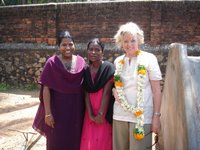
I am back at my hotel restaurant, with Sundar bringing me tea. So much has happened I don’t know where to begin-and I am exhausted.
I notice that the physical discomforts we are experiencing seem unimportant and not-to-bothersome in comparison to other difficulties. I’ve become accustomed to shaking out my towel before using it to make sure there are no cockroaches, and the critters that gather in the corners of the shower don’t seem to bother me. I am even used to the ways of driving in this country, I cannot even begin to describe that! We are, however, running low on toilet paper, and that I’m going to need to figure out!!!
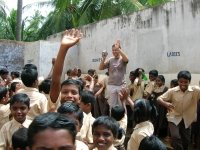 th our Kadiapattinam friends, they picked us up at the hotel at 6:00 p.m. and drove us 45 minutes to their town. It was the most BEAUTIFUL sunset trip, with elephants along the side the road, mists on the rocky mountains and colors too brilliant to describe. We spent the evening talking about the conditions of the villages most heavily affected by the Tsunami, and the projects that are now under way. It turns out that AWED stands for Association of Womens Education and Development.
th our Kadiapattinam friends, they picked us up at the hotel at 6:00 p.m. and drove us 45 minutes to their town. It was the most BEAUTIFUL sunset trip, with elephants along the side the road, mists on the rocky mountains and colors too brilliant to describe. We spent the evening talking about the conditions of the villages most heavily affected by the Tsunami, and the projects that are now under way. It turns out that AWED stands for Association of Womens Education and Development. Cedric and I have been committed from the beginning to not give any services or assistance that WE think they should have, but to allow them to tell us what they need, and then decide if we can help. The well in Kadiapattiam had been a request from Father Gino, and he certainly wanted it bad enough – he made it happen. One of the things we have le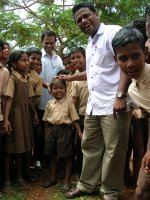 arned from Father is that these villages and the fisherman in them are the bottom of the bottom of the caste system. In the past, these villages and people “fell off the map” for any sorts of government assistance or involvement. In fact, so much so that they have very little government involvement at all, and so they are entirely run by the Catholic church. In a strange sort of way, the tsunami has been a tremendous blessing to them. It has gotten them services they would not have had, it is improving their opportunities and quality of life, and it is bringing education and awareness to an outcasted piece of their society. This is NOT my American version of what is happening here, it is the interpretation of Father Gino and others.
arned from Father is that these villages and the fisherman in them are the bottom of the bottom of the caste system. In the past, these villages and people “fell off the map” for any sorts of government assistance or involvement. In fact, so much so that they have very little government involvement at all, and so they are entirely run by the Catholic church. In a strange sort of way, the tsunami has been a tremendous blessing to them. It has gotten them services they would not have had, it is improving their opportunities and quality of life, and it is bringing education and awareness to an outcasted piece of their society. This is NOT my American version of what is happening here, it is the interpretation of Father Gino and others.
As we approached a piece of coast that has been supported with huge boulders as a sea retaining wall to protect the  ottie (the kind found at day 4 of a rock concert). The sea mist smelled of crap, and the foam around the rocks was yellow and foamy, unlike any sea foam I had ever seen. All along the coast looked like a garbage dump, with crows everywhere and incredible amounts of trash. The poorest of the poor live closest to the water. I could not help but marvel at the differing values of “ocean front property”.
ottie (the kind found at day 4 of a rock concert). The sea mist smelled of crap, and the foam around the rocks was yellow and foamy, unlike any sea foam I had ever seen. All along the coast looked like a garbage dump, with crows everywhere and incredible amounts of trash. The poorest of the poor live closest to the water. I could not help but marvel at the differing values of “ocean front property”.
As we toured the villages, Father Gino took us to his parish school, St. Helen’s. It is for ages 6-15. As we toured we were shown their water fountain where the children both wash and drink. It was in a HORRIBLE state of disrepair, with only 2 of the 12 spickets working, broken tiles, pipes, flooded swamp area and overgrown with moss and worms. As we were taking pictures of the area children were released onto their recess, and hundreds of children swarmed the two working spickets (and US!). Immediately, Cedric and I knew we wanted to fix this area. These children needed better access to water, and we knew we could do something about it. We met with the Dean, who then contacted a contractor, and by the afternoon we were sitting in a budget meeting discussing what could be done. Our tour also showed that their kitchen facilities were in a terrible state of disrepair, as are their pre-school classrooms. So, we asked the contractor for a budget to fix it all………a short while later we were shaking hands and handing them their first installment of rupees and the project begins TODAY!. Father Gino says we will see the first stage of improvements before we leave Nagracoil.
their recess, and hundreds of children swarmed the two working spickets (and US!). Immediately, Cedric and I knew we wanted to fix this area. These children needed better access to water, and we knew we could do something about it. We met with the Dean, who then contacted a contractor, and by the afternoon we were sitting in a budget meeting discussing what could be done. Our tour also showed that their kitchen facilities were in a terrible state of disrepair, as are their pre-school classrooms. So, we asked the contractor for a budget to fix it all………a short while later we were shaking hands and handing them their first installment of rupees and the project begins TODAY!. Father Gino says we will see the first stage of improvements before we leave Nagracoil.
The intricacies of the politics here, of the corruption and blame and lack and need and struggles are more than I can explain or understand. This is a culture and society that is incomprehensible to the average American (or at least this one). Not only did I not know this existed, there is no way for me to begin to understand what is 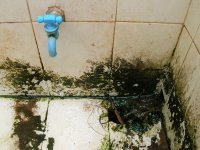 really going on here.
really going on here.
Last night, we returned to Kadiapattinam to attend the after school “tuition” program (tutor), and to have dinner with the teachers. They are a unique group of young people. We were joined by Father Edwin, who is young, good looking, healthy, strong, smart and well educated in the ways of society outside of
During the evening I wanted to take a walk, so Jesu took me on a tour of the village. We talked about lots of things, and mostly his desire to better himself. He explained how difficult that is here, when all of his world experience is just this village, and his college in the nearby town of
As we were walking through the small alleys of the village, people came out to talk to us. Suddenly, Jesu kicked off his shoes and entered into a house – he obviously expected me to follow. It was the home of Pepe, one of his secondary students who had spent the previous evening with us. I was immediately escorted into a back room to meet his aunt, who had polio as a child, and has not walked since she was a young girl. She lives on a cushion on the floor. Plastic chairs were immediately unstacked, someone fetched a fan to place directly on me (someone must have said I was hot), and I was handed some sort of food. (NEVER have I been fed so much – more about that later). The conversation became based on me wanting to learn Tamil – and so they began to teach me words. We laughed and laughed and laughed. We found quite a bit of entertainment in my mispronunciations of their words. They seem astonished that I will even try.
The evening culminated with our Project #2. After much discussion and preparation, we have decided to give this group of teachers one of our laptops. (again, because they say it is something that will enhance their quality of life). Cedric has set it up with Windows and internet, Jesu is researching getting internet to the village (it is already there in a limited fashion). Saturday, Cedric will give a computer class to this group of young teachers (although three of them are already in computer studies), and we are hopeful that we will all stay in contact as we continue to find ways to support this beautiful village on the sea.
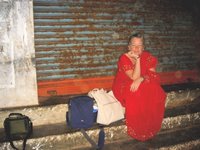


0 Comments:
Post a Comment
<< Home